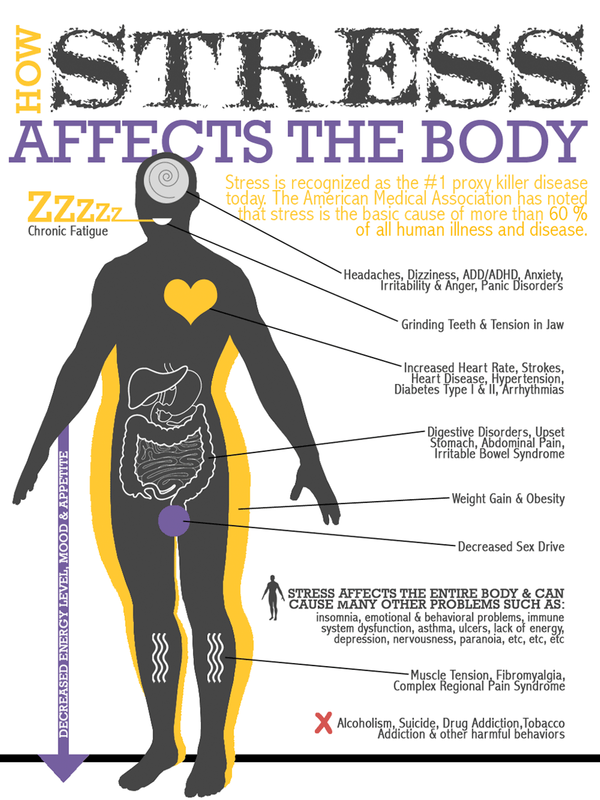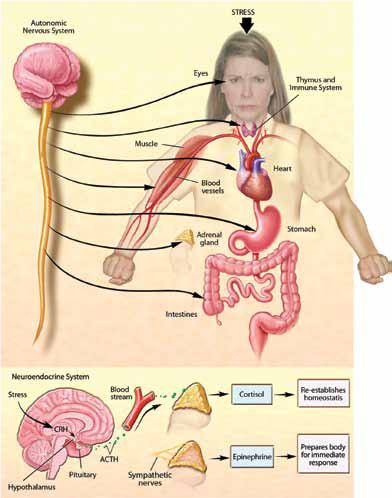Chapter 7: Stress
In this Chapter
Chronic Stress
1What do standing frustrated in a supermarket checkout line or sitting in a traffic jam have in common with fleeing predators, as was done in the early days of human beings? Clearly, these activities are very different, yet they provoke the same responses in the body— the release of hormones (glucocorticoids and epinephrine) to improve memory, boost immune function, enhance muscular activity, and restore physiological balance. Over long periods of time, as these hormones continue to be released, the consequences can be negative: memory is impaired, immune function is suppressed, and energy is stored as fat.
2Overexposure to glucocorticoids leads to weakened muscles. Elevated glucocorticoids and epinephrine contribute to hypertension (high blood pressure), atherosclerosis (hardening of the arteries), and abdominal obesity. Epinephrine also increases the release and activity of body chemicals that cause inflammation, adding to the body’s chronic stress burden. This continual chemical activity can lead to arthritis and accelerated aging of the brain.
3These findings have been verified in animal experiments. Aging rats show impaired neuron function in the hippocampus — an area of the brain important for learning, memory, and emotion — as a result of increased glucocorticoid secretion throughout their lives.
4Overexposure to glucocorticoids also increases the number of neurons damaged by stroke. Moreover, prolonged glucocorticoid exposure before or immediately after birth causes a decrease in the normal number of brain neurons and smaller brain size.
5What’s more, scientists have identified a variety of stress-related disorders, including high blood pressure, clogged arteries, impotency and loss of sex drive in males, irregular menstrual cycles in females, colitis, and adult-onset diabetes. Stress also can contribute to sleep loss when people get caught in a vicious cycle elevated glucocorticoids delaying the onset of sleep, and sleep deprivation raising glucocorticoid levels.

6Different Body Systems Affected Many different body systems are affected by stress The immune system receives messages from the nervous system, and it is also sensitive to many of the body’s circulating hormones, including stress hormones. Although short-term elevations of stress hormones facilitate immune function and can be protective against disease pathogens, sustained exposure to glucocorticoids suppresses the immune system often with negative consequences.
7That said, however, glucocorticoid induced immunosuppression also has its benefits. Normally, glucocorticoids rein in the immune system boost brought on by stress Without this brake, there is an increased chance of autoimmune disorders caused by an overactive immune system Such autoimmune disorders occur when the body’s immune defenses turn against itself. Then the individual must be treated with synthetic, man-made forms of glucocorticoids (e. g., hydrocortisone and prednisone) in order to keep the immune system in check.
8One important determinant of resistance or susceptibility to disease may be a person’s sense of control, as opposed to a perceived lack of control or helplessness. This psychological factor may help explain the large individual differences in the physical response to stress Scientists are actively pursuing this line of research. They are trying to identify how perception of control can alter physiological responses to stress including the regulation of immune function.

9The cardiovascular system also receives messages from the autonomic nervous system, and stressful experiences have immediate and direct effects on heart rate and blood pressure. In the short term, these changes help facilitate a quick response to stressors. But when stressors are chronic and psychological, the effect can be harmful and result in accelerated atherosclerosis and increased risk for heart attack. Research supports the idea that people holding jobs that carry high demands and low control, such as telephone operators, waiters, and cashiers, have higher rates of heart disease than people who can dictate the pace and style of their working lives.
10In addition, personality or behavioral type affects an individual’s susceptibility to heart attack. People at greatest risk are hostile and irritated by trivial things. One study illustrates this point. Researchers studied two groups of men categorized as having high or low hostility. Both were subjected to harassment. Scientists found that harassed men with high hostility scores had larger increases in levels of stress hormones, muscle blood flow, and blood pressure. Thus, for those people with personality traits that include high levels of hostility, learning to reduce or avoid anger could be important to avoid cardiovascular damage.
